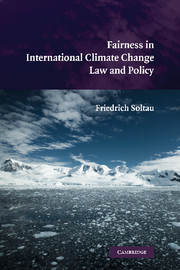Book contents
- Frontmatter
- Contents
- List of Abbreviations and Acronyms
- Acknowledgments
- 1 Fairness in International Climate Law and Policy
- 2 The Science of Climate Change and the Energy Challenge
- 3 Development of the International Climate Change Regime
- 4 Theoretical Aspects of Fairness
- 5 Fairness in the Climate Change Regime
- 6 Evaluation of Proposals for Future Climate Policy
- 7 Conclusion
- Bibliography
- Index
- References
4 - Theoretical Aspects of Fairness
Published online by Cambridge University Press: 24 December 2009
- Frontmatter
- Contents
- List of Abbreviations and Acronyms
- Acknowledgments
- 1 Fairness in International Climate Law and Policy
- 2 The Science of Climate Change and the Energy Challenge
- 3 Development of the International Climate Change Regime
- 4 Theoretical Aspects of Fairness
- 5 Fairness in the Climate Change Regime
- 6 Evaluation of Proposals for Future Climate Policy
- 7 Conclusion
- Bibliography
- Index
- References
Summary
INTRODUCTION
Claims about fairness and justice stand at the center of debates about our collective response to climate change. But what does fairness mean? Clearly it is a deeply contested concept, one that reasonable persons can understand in inconsistent and even incompatible ways. As fairness assumes greater currency and salience in climate policy, it is worthwhile to outline briefly the main approaches that lead to some of the arguments put forward in the climate regime. Fairness and justice can be analyzed at quite abstract levels, but the problem of climate change quickly directs the enquiry to the practical, real-world questions. Thus the chief aim of this chapter is to identify a number of principles that could shape different conceptions of fairness in the context of climate change – principles around which one can construct a rough, working consensus of values influencing the debate on the question of sharing the burdens and benefits of combating climate change. Yet caution is advised in plucking conceptions of fairness and justice developed in particular theoretical frameworks and attempting to apply them, in a somewhat pell-mell fashion, to the problem of climate change. The potential for error is large, but fairness in climate change should also be carried at a level that mixes ethics and morals, science and interests.
- Type
- Chapter
- Information
- Fairness in International Climate Change Law and Policy , pp. 133 - 178Publisher: Cambridge University PressPrint publication year: 2009



